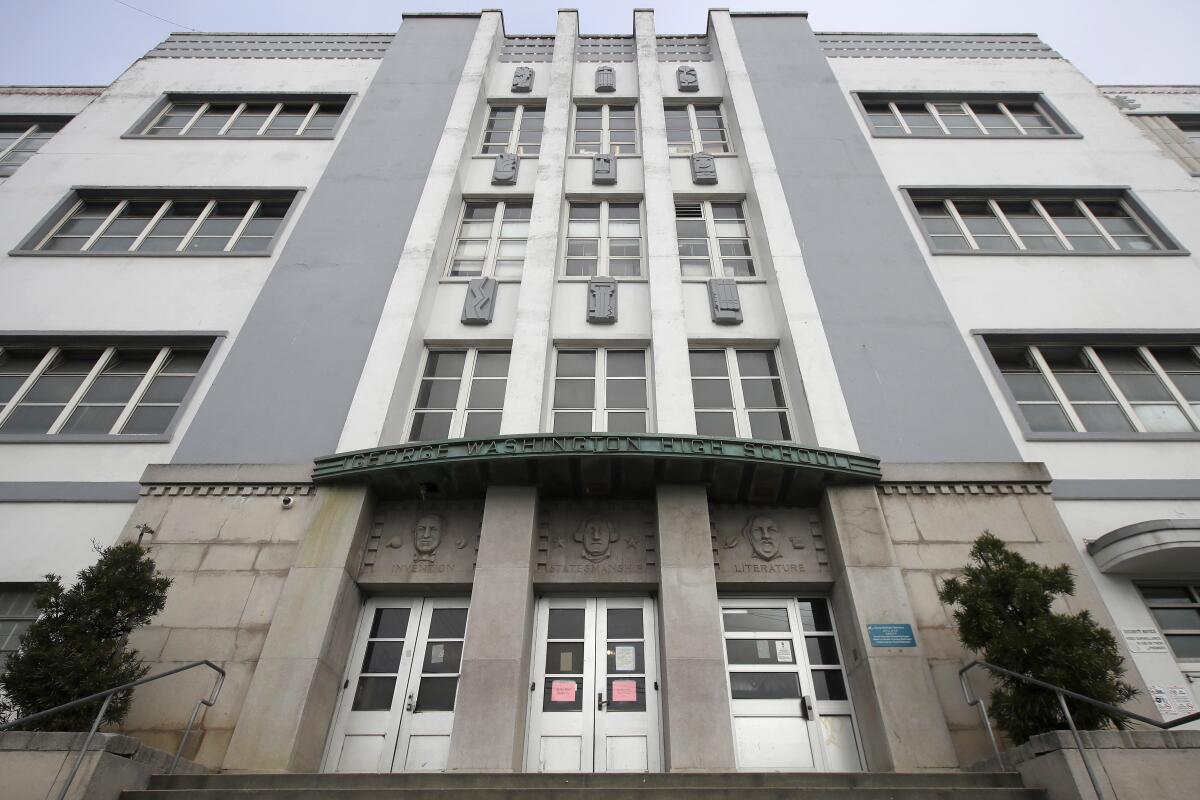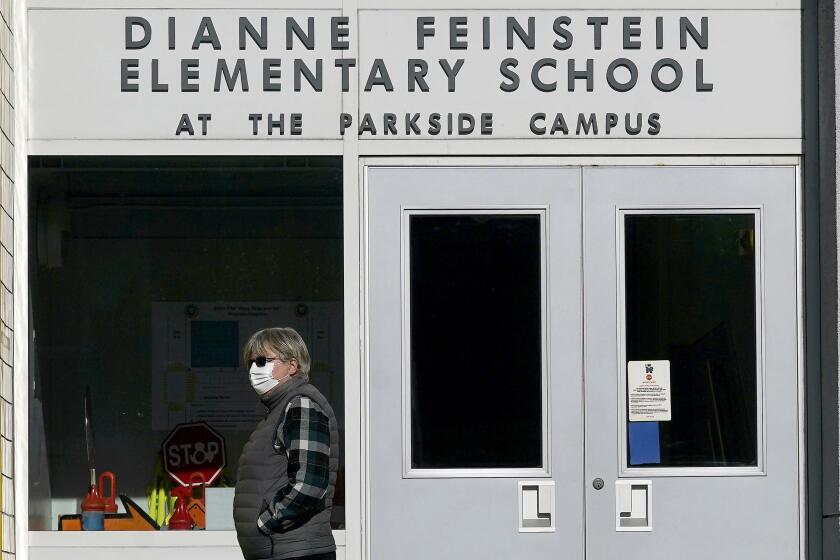San Francisco board halts renaming of public schools after months of furor and debate

- Share via
Putting on hold a controversy that had dogged it for months, the San Francisco Unified School District Board of Education voted unanimously Tuesday to suspend plans to rename a third of its public schools, including those named after presidents George Washington and Abraham Lincoln.
In voting to overturn its previous decision, the board provided breathing room for San Franciscans upset at the renaming of public schools through what they saw as a flawed process. But it also frustrated school activists hoping the district would no longer honor U.S. historical figures they see as linked to white supremacy, colonization, slavery and oppression.
The board heard from both sides late Tuesday night, with some supporting the board’s reversal and others angry that San Francisco had become a punching bag for right-wing media.
In the end, the board formalized a February statement by President Gabriela López that the district would pause the renaming process until students returned to full-time learning inside classrooms.
“We recognize we need to slow down. And we need to provide more opportunities for community input. We are working with educators at all levels to involve and educate our school communities about the renaming process,” López wrote at the time in a San Francisco Chronicle op-ed.
Tuesday’s action came partly in response to high school alumni associations and community stakeholders, led by attorney Paul Scott, sued the school district to overturn its earlier vote to rename the schools. They alleged that the district violated the Brown Act, which governs how public meetings are run, and denied due process to school community members with the initial renaming decision.
“To be clear, we understand and support the notion of being reflective on our history and looking back. And in some instances, it’s appropriate to change names of institutions or schools,” Scott said in an interview Monday. “It’s a matter of doing it in a way, though, that respects community will and the interests of the relevant stakeholders.”
The school renaming controversy has hung over city politics the past six months, after a board-appointed committee recommended changing the names of 42 schools, including those honoring individuals such as Lincoln, Washington and Sen. Dianne Feinstein.
When the board voted 6-1 to approve the name changes in January, Jeremiah Jeffries, a teacher and leader of the renaming committee, was elated, stating: “We are unapologetically going after white supremacy.” Some students and families in the district celebrated the prospect of new names highlighting more modern community heroes.
But news of the renaming was met by disbelief both locally and across the country. Several local alumni associations defended their schools’ legacies in letters and comments to the board, and others condemned the committee’s research, which relied in part on Wikipedia articles.
In an interview Monday, state Sen. Scott Wiener (D-San Francisco) noted the school committee had wanted to rename Sanchez Elementary School in the Castro District because it mistakenly thought it was named after a conquistador. Actually, he pointed out, it was named after a street.
Scott, the lawyer, also noted that James Lick Middle School made the renaming list because of a statue, “Early Days,” that showed a vaquero (cowboy) and a missionary standing above a prostrate Native American.
“The only problem was that the sculpture was commissioned 17 years after Lick died,” Scott said.
Lick, who died in 1876, was a wealthy land baron and patron of the sciences. He left most of his fortune to the public for social and scientific enterprises, including an observatory.
The vote would formalize an announcement by the Board of Education president last month to pause the renaming effort.
Aside from historical questions, local political leaders slammed the timing of the renaming discussion when children were not yet back in school during the COVID-19 pandemic. Mayor London Breed called the situation “offensive.” Her frustration contributed to the city’s unusual move to sue its own school district, trying to force the board’s hand to bring students back for in-person learning.
While the city was unable to immediately prevail in that lawsuit, the litigation became moot — students will begin returning to classrooms next week, and López pledged all will return by fall.
Hanging over Tuesday’s school district vote — and taking up nearly an hour of public comment — was the status of board Vice President Alison Collins, who has come under scrutiny for posting tweets in 2016 that many have called racist against Asian people. The board voted last month to remove Collins from her post as vice president, after she refused calls to resign.
Collins addressed the issue in a blog post, apologizing and saying the tweets were “taken out of context” amid a national furor over anti-Asian violence in the Bay Area and elsewhere. She has since sued the district and several of her board colleagues, further straining relationships on a public body that has come under a microscope.
Times staff writer Maura Dolan contributed to this report.
More to Read
Sign up for Essential California
The most important California stories and recommendations in your inbox every morning.
You may occasionally receive promotional content from the Los Angeles Times.















